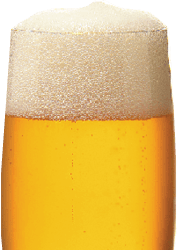Pelican Brewing Co.’s Kiwanda Cream Ale clone
Pelican Brewing Co.’s Kiwanda Cream Ale clone
(5 gallons/19 L, all-grain)
OG = 1.049 FG = 1.007
IBU = 25 SRM = 4 ABV = 5.4%
Not all late-hopped beers need to be aggressive. Pelican Brewing Co. from Cannon Beach, Oregon created the first modern beer recipe I heard about in which the first hopping addition was after flameout. This is the perfect summer beer to enjoy on the water.
Ingredients
9 lbs. (4.1 kg) 2-row pale malt
13 oz. (370 g) dextrin malt
8 oz. (230 g) flaked barley
10 AAU Mt Hood hops (0 min.) (2 oz./57 g at 5% alpha acid)
Wyeast 1056 (American Ale) or White Labs WLP001 (California Ale) or Safale US-05 yeast
3⁄4 cup corn sugar (if priming)
Step by Step
Mill the grains and mix with 15.5 qts. (14.6 L) of 162 °F (72 °C) strike water to reach a mash temperature of 150 °F (66 °C). Hold this temperature for 90 minutes. Vorlauf until your runnings are clear. Sparge with enough water to obtain 6.5 gallons (24.6 L) of wort. Boil for 60 minutes. After the boil, turn off heat and begin a whirlpool of the hot wort. Add the hops while whirlpooling. Let stand for 20 minutes, then chill the wort to 65 °F (18 °C). Aerate with pure oxygen or filtered air and pitch yeast.
Ferment at 65 °F (18 °C) for 7 days. Raise to 70 °F (21 °C) for three more days. Once the beer reaches terminal gravity, bottle or keg and carbonate to approximately 2.5 volumes. You can cold-crash the beer prior to packaging to 35 °F (2 °C) for 48 hours to improve clarity.
Pelican Brewing Co.’s Kiwanda Cream Ale clone
(5 gallons/19 L, partial mash)
OG = 1.049 FG = 1.007
IBU = 25 SRM = 4 ABV = 5.4%
Ingredients
4.25 lbs. (2 kg) extra light dried malt extract
1 lb. (0.45 kg) 2-row pale malt
13 oz. (370 g) dextrin malt
8 oz. (230 g) flaked barley
10 AAU Mt Hood hops (0 min.) (2 oz./57 g at 5% alpha acid)
Wyeast 1056 (American Ale) or White Labs WLP001 (California Ale) or Safale US-05 yeast
3⁄4 cup corn sugar (if priming)
Step by Step
Bring 1 gallon (4 L) of water to approximately 160 °F (71 °C). Submerge the milled grains in grain bags and steep for 45 minutes, trying to maintain the temperature at about 150 °F (66 °C). Remove the grain bags, and place in a colander. Wash the grains with 1 gallon (4 L) hot water. Add the dried malt extract while stirring, and stir until dissolved, then top off to 5 gallons (19 L). Boil for 30 minutes. After the boil, turn off heat and begin a whirlpool of the hot wort. Add the hops while whirlpooling. Let stand for 20 minutes, then chill the wort to 65 °F (18 °C) and transfer wort
to the fermenter. Top off the fermenter to 5 gallons (19 L), then aerate with pure oxygen or filtered air and pitch yeast.
Ferment at 65 °F (18 °C) for 7 days. Raise to 70 °F (21 °C) for three more days. Once the beer reaches terminal gravity, bottle or keg and carbonate to approximately 2.5 volumes. Cold-crash prior to packaging to 35 °F (2 °C) for 48 hours to improve clarity.
Backstory:
As Brewmaster Darron Welch explains it, “The reason Kiwanda is a whirlpool-only beer has to do with the early process of developing this beer. Initially, the beer had a more conventional formula, although still heavily weighted towards finishing hops for emphasis on hop aroma character rather than bitterness. Early batches hit the aroma targets but seemed too bitter from sensory work. Since Pelican has used outside lab services almost from the beginning of our operations, I sent samples off and confirmed that the beer was too bitter for the designed target specification.
“Wanting to keep the aromatic presence of the beer intact, I started gradually reducing the base bittering addition and the mid-kettle addition incrementally, getting laboratory feedback all along the way. It got to the point where my adjustments of kettle hops were having basically no impact on perceived or measured bitterness, so I simply abandoned them entirely. Subsequent testing showed that by eliminating all kettle hops and doing only the whirlpool addition, I not only hit the measured IBU specification, but more importantly, I was getting the balance of flavor, aroma, and bitterness that I had imagined when designing the beer in the first place.
“Hops added partway through the boil — 15–30 minutes of boil time — will tend to give more bitterness than might be traditionally expected, and not as much aroma as with a whirlpool addition. Part of it has to do with the overall design of the beer and the formulation.”
Written by Dave Green

Pelican Brewing Co. from Cannon Beach, Oregon created the first modern beer recipe I heard about in which the first hopping addition was after flameout. This is the perfect summer beer to enjoy on the water.


